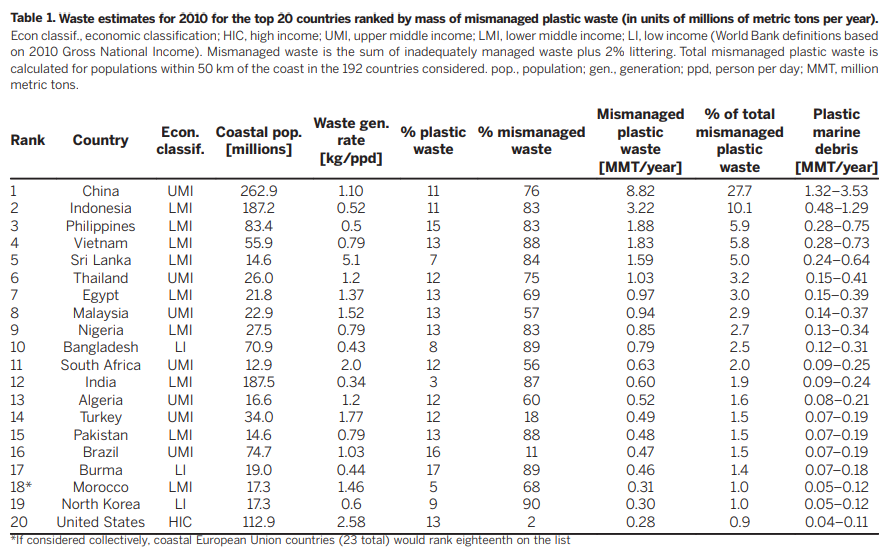Challenge statement
Challenge type: If you are working on multiple challenges, please indicate if this is your "big bet" or "exploratory" challenge.
Please note: we ask you to only submit a maximum of 3 challenges - 1x Big Bet, 2x Exploratory. Each challenge must be submitted individually.
EXPLORATORY
Challenge statement: What is your challenge? (Please answer in specific terms: "Our challenge is that...”.)
As the world’s largest archipelagic country with 70% of the country is water, Indonesia is struggling with a serious environmental challenges related to marine debris. In 2015, a global study estimating the worldwide inputs of plastic waste into the oceans ranked Indonesia as the second largest contributor to plastic marine pollution [1]. In response to this issue, in 2018, the Indonesia’s government issued the Presidential Regulation No. 83/2018 on Marine Debris Management (National Plan of Action on Marine Plastic Debris), pledging to reduce plastic and other marine waste by 70% by 2025 [2].
Through the issuance of the Presidential Regulation No. 83/2018, the Indonesian government also established the National Coordination Team for Marine Waste Management (TKN PSL) as a task force to provide strategic directions for Indonesia’s government agencies and foster cross-sector collaborations in tackling the marine waste issues over an 8-year period [REDACTED_PHONE]).
In 2021, TKN PSL enacted a project called GRADASI (Indonesian Waste Alms Movement), a campaign inviting the local communities to reduce domestic wastes by donating their recycle-able wastes to the religious facilities (mosques, churches, viharas, and temples). It aims to promote behavioural change in waste management at the local community level incorporating a religious approach. Since its inception in 2018, the GRADASI project has collected donations of over 198,879 kg of waste [3] through the mobilization of 127 mosques, 46 churches, 5 universities, and 192 schools and Islamic boarding schools across various regions in Indonesia. [3]
Our challenge is to identify whether the religious and faith-based approach of the GRADASI project has had a significant influence in community’s behaviour in waste management, relative to non-faith-based approach to waste management and circular economy.
[1] Jambeck, J. R., Geyer, R., Wilcox, C., Siegler, T. R., Perryman, M., Andrady, A., Narayan, R., Lavender Law, K. (2015). Plastic waste inputs from land into the ocean. Science, 347, 6223, 768-771, https://doi.org/10.1126/science.[REDACTED_ID]
[2] Government of Republic of Indonesia (2018). Marine Debris Management (National Plan of Action on Marine Plastic Debris).
[3] GRADASI (2024). Total Sedekah Sampah Terkumpul. https://gerakansedekahsampah.id/
Background: What is the history of your challenge? What is causing or driving it? Who is involved? How does the current situation look like? What undesired effects does it produce?
The UNDP Indonesia Accelerator Lab has been actively engaged in addressing environmental challenges and urban resilience, including marine pollution, through innovative approaches such as the Behavioural Study for the Interfaith Waste Charity Movement. The involvement of the UNDP Accelerator Lab underscores the recognition of the urgency and complexity of addressing these environmental issues through multifaceted strategies.
The driving force behind this challenge is the recognition that traditional waste management approaches alone may not be sufficient to address the scale of marine pollution in Indonesia. Therefore, exploring innovative, community-driven solutions, such as the GRADASI project, which incorporates religious and faith-based elements, becomes imperative. The involvement of religious institutions and communities in waste management efforts presents a unique opportunity to leverage existing social structures and cultural norms to promote sustainable behaviour change.
The key stakeholders involved in this challenge include Indonesian Government (such as the National Coordination Team for Marine Waste Management (TKN PSL), Coordinating Ministry for Maritime and Investment Affairs, Ministry of Environment and Forestry), religious institutions (such as mosques, churches and viharas) which serve as collection points for recyclable waste and promoting waste reduction and recycling within their communities, CSOs (as the research partner), and the community members who are engaged in the GRADASI project and participating in waste management activities driven by religious and faith-based motivations.
The current situation reflects ongoing efforts to assess the effectiveness of the GRADASI project in promoting behavioural change in waste management practices. While the project has demonstrated success in mobilizing communities and collecting significant amounts of recyclable waste, there is a need to conduct a comprehensive behavioural study to evaluate its impact relative to non-faith-based approaches and identify areas for improvement.
Quantitative evidence: What (official) data sources do you have on this challenge that better exemplifies the importance and urgency of this frontier challenge? You can add text, a link, or a picture.
According to a global study by Jambeck et al. (2015) that estimated the worldwide inputs of plastic waste into the oceans, Indonesia ranks as the second largest contributor to plastic marine pollution, with coastal pollutions estimated around 3.22 million metric tons per year. (table below)
Ineffective waste management processes on land mostly leads to leakages into the aquatic areas. 80% of Indonesia's marine debris originates from land, with 30% of it categorized as plastic waste. Every year, 1.29 million tons of plastic waste, influenced by tidal waves, enter Indonesian waters and contribute to local waste accumulation (Coordinating Ministry for Maritime Affairs and Investment, 2018).
Qualitative evidence: What weak signals have you recently spotted that characterizes its urgency? Please provide qualitative information that better exemplifies the importance and urgency of this frontier challenge. You can add text, a link, or a picture.
Qualitative evidence that exemplifies the urgency of researching the influence of religious-based approach in communities’ waste management behaviour, include:
Government Commitment: the commitment of Indonesian government to reduce the plastic and other marine waste by 70% by 2025, followed by the issuance of Presidential Regulation No. 83/2018 on Marine Debris Management, demonstrates a commitment to tackling the issue of plastic pollution and fostering cross-sector collaborations to achieve meaningful results. Concrete action plans are needed to achieve this ambitious goal.
Local Community Engagement: growing awareness and concern among local communities about the environmental impacts of marine pollution. Many individuals are actively participating in initiatives like beach clean-ups and waste segregation programs, indicating a grassroots movement towards environmental stewardship.
Value proposition: What added value or unique value proposition is your Accelerator Lab bringing to solving this challenge? Why is it your Lab that needs to work on this challenge and not other actors within UNDP, other stakeholders in the country respectively? Why is it worth investing resources to this challenge?
The added values UNDP Indonesia Accelerator Lab brings to this behavioural study include fostering innovative approach (such as human-centered design, systems thinking, mixed method research) develop novel solutions tailored to the specific context of marine pollution in Indonesia, as well as engaging diverse stakeholders to enhance coordination, scalability, and sustainability of the intervention.
As a global development actor, UNDP plays a pivotal role in advancing the SDGs, including catalyses collective action towards achieving global environmental objectives. The UNDP Indonesia Accelerator Lab needs to work on this project for several reasons:
- Environmental impact. Addressing marine pollution contributes to the preservation of marine ecosystems, biodiversity conservation, and mitigation of climate change impacts.
- Economic benefits. Effective waste management initiatives create economic opportunities for the locals, such as recycling industries, waste-to-energy projects, and green jobs.
- Social cohesion. Mismanaged waste disproportionately affects vulnerable communities, exacerbating inequalities and social injustices. Investing in initiatives that promote community engagement, empowerment, and resilience-building fosters social cohesion, equity, and inclusivity, contributing to peaceful and prosperous societies.
Short “tweet” summary: We would like to tweet what you are working on, can you summarize your challenge in a maximum of 280 characters?
UNDP Accelerator Lab Indonesia is conducting research on the role of faith-based messages in the local communities’ waste management behaviour, in support of the Indonesian government plan to cut the marine waste by 70% by 2025.
Learning questions
Learning question: What is your learning question for this challenge? What do you need to know or understand to work on your challenge statement?
Is there any indication that religious messaging influences waste sorting behaviour?
To what stage(s) in the learning cycle does your learning question relate?
Test
Usage of methods: Relating to your choice above, how will you use your methods & tools for this learning question? What value do these add in answering your learning question?
This study is using Cooperative Inquiry as its main approach, framing the overall research process into a series of reflection-action cycles (learning cycle) involving external co-researchers that have intersections of interest/experience in the research topic.
The research employs a mixed-methods of both qualitative (Interview/COM-B Survey) and quantitative (Experimental Design) methodologies to comprehensively explore how religious messaging influences waste sorting behaviours. This dual approach allows for a well-rounded understanding of the interplay between religious convictions and waste management practices, ensuring a comprehensive analysis of the topic.
Existing data gaps: Relating to your choice above, what existing gaps in data or information do these new sources of data addressing? What value do these add in answering your learning question?
The focus of the behavioural study is to understand 3 main points:
1. To understand the people’s perception and intrinsic motivation on waste sorting behaviour
2. To understand the type of delivery and content of religious messaging that effectively influence the waste sorting behaviour.
3. To gather insights on whether the findings vary across different religious communities.


 3Good health and well-being
3Good health and well-being 14Life below water
14Life below water
Comments
Log in to add a comment or reply.